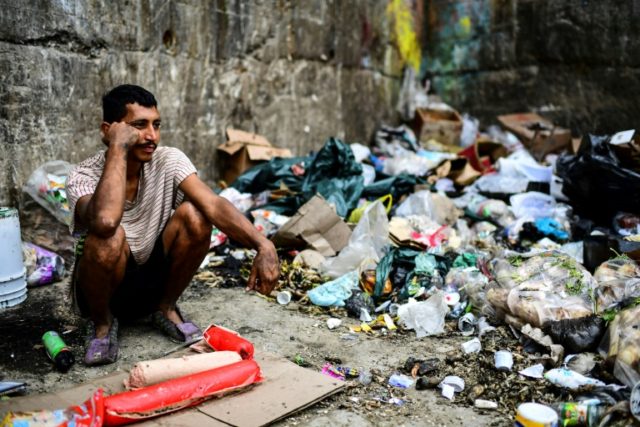Venezuela’s socialist dictator Nicolás Maduro has triggered the “worst humanitarian crisis in the history of the Americas” with the help of Cuba, Russia, China, and terrorist groups, the executive director of the Foundation for Human Rights in Cuba (FHRC) told Breitbart News Friday.
The deteriorating security, political, and humanitarian conditions in Venezuela are comparable to those in war-ravaged Syria, Juan Antonio Blanco, the director, wrote in a report he co-authored with other Cuban and Venezuelan experts.
In the report issued Friday, FHRC declared:
Citizen insecurity, added to political repression, has left more than 24,000 violent deaths [in Venezuela] in 2018, – not including the thousands that have died of malnutrition and lack of medicines – comparable to the total that occurred in Afghanistan, Syria and Iraq [respectively] in the same period. An exodus of three million equates those refugees coming out of Syria. A man-made regional catastrophe.
The U.K.-based Syrian Observatory for Human Rights, a monitor group that uses ground sources to track the conflict in the Middle Eastern country, reported at the end of 2018 that 20,000 people were killed in Syria’s civil war last year, less than the estimated 24,000 who perished in Venezuela during the same period.
Some analysts, including Dany Bahar from the Brookings Institution, predicted that the socialism-fueled humanitarian crisis plaguing the Venezuelan people with hunger, disease, poverty, and death could eclipse Syria’s.
Breitbart News spoke to Blanco after FHRC released its new study on Capitol Hill.
Blanco told Breitbart News, “If you allow the crisis to keep on going, I’m sad to say that you can actually draw very, very chilling parallels between the Syrian crisis and Venezuelan crisis with actually a factor [Maduro’s connection to the illicit drug trade] that makes, potentially, the Venezuelan crisis worse.”
“The second largest source of revenue [after oil] for the Maduro regime is basically the illicit trade, mainly drug trafficking,” the director explained. “With that type of resources, it’s very hard to imagine them simply conceding and relinquishing power.”
He argued that Maduro does not deserve the dictator moniker because he is a criminal drug trafficker, not a state official.
Blanco referred to the situation in Venezuela as “the worst humanitarian crisis in the history of the Americas,” adding that “if it keeps on going the way it is, it’s going to be one of the worst in the world’s history.”
Similar to the situation with Syrian dictator Bashar al-Assad, the Maduro regime reportedly has the support of Russia, Iran, China, as well as the U.S.-designated terrorist group considered to be one of the top drug trafficking groups in Latin America, Tehran’s proxy Hezbollah.
Left-wing terrorist organizations the Revolutionary Armed Forces of Colombia (FARC) and National Liberation Army (ELN), who also participate in drug trafficking, are also supporting Maduro, Blanco noted.
Pro-Maduro China is operating in Venezuela on the “financial side, intelligence gathering,” and is also helping transport crude oil to Cuba in violation of U.S. sanctions, the director said.
Blanco stressed that every “democratic soul” in the international community, including those in the United States, must deal with the foreign intervention in Venezuela fueling the catastrophe in the country “before it becomes a crisis of strategic proportions.”
The human rights group director asserted that Havana dominates the foreign intervention in Venezuela, which the new FHRC report refers to as a “Cuban colony.”
Cuba is reportedly working along with the Russians, Chinese, Iranians, Hezbollah, the FARC, and ELN on behalf of Maduro.
“The most important component is the Cuban contingent,” Blanco told Breitbart News.
“Their level of penetration reaches every single relevant institution in the country. So basically you cannot imagine a democratic Venezuela if you don’t deal with that factor, it’s simply impossible because basically they are embedded in the relevant security institutions and organizations. They are basically ruling what’s going on inside the army, national security, and the intelligence apparatus,” he also said.
Asked whether the Cuba-Venezuela alliance poses a threat to the United States, that is a “resounding yes,” Blanco responded, echoing recent comments by U.S. Secretary of State Mike Pompeo.
He suggested that the United States should not rule out military action in Venezuela.
U.S. President Donald Trump’s administration – which, along with more than 50 countries, has recognized Juan Guaido as Venezuela’s interim president – has said that all options are on the table.
Pompeo told lawmakers this week that the Maduro regime poses a “true threat” to the United States.
In announcing more U.S. sanctions against the Maduro regime, the U.S. Department of State (DOS) reported on Friday:
Venezuela’s ongoing democratic transition is being impeded by malign actors that continue to prop up the former Maduro regime. Venezuelans lack access to basic necessities, such as water, electricity and adequate health care, while Maduro and his cronies continue to enrich themselves and strip Venezuela of its natural assets.
…
The United States will continue to do all we can to stand up against Cuba’s support for the former Maduro regime and its hostility to the Venezuelan people’s aspiration to a peaceful, prosperous, democratic future.
Several U.S. officials have acknowledged that some of the Maduro regime’s illicit activities are feeding America’s appetite for illegal drugs amid an unprecedented number of lethal overdoses that have killed tens of thousands in recent years.
Most of the drugs in the United States, primarily the cocaine and heroin causing some of the overdoses, originate in Latin America, according to the Drug Enforcement Agency (DEA), a component of the U.S. Department of Justice (DOJ).

COMMENTS
Please let us know if you're having issues with commenting.